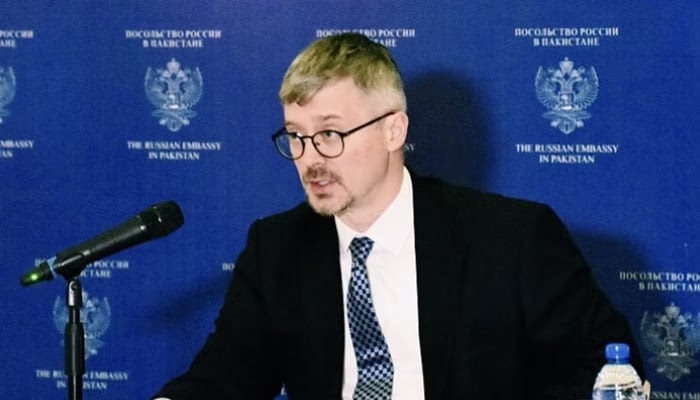The recent Russia mediation offer to help ease tensions between Pakistan, India, and Afghanistan marks a significant diplomatic development in South Asia. During a discussion at the Institute of Strategic Studies Islamabad, Russia’s Ambassador to Pakistan, Albert Khorev, stated that Moscow is ready to play a constructive role in supporting peace efforts between the region’s most volatile neighbours. His remarks come at a time when Pakistan’s relations with both India and Afghanistan remain strained due to security incidents, border clashes, and long-standing political disputes.
Ambassador Khorev made it clear that Russia views Pakistan as an important regional partner and acknowledges the country’s central role in maintaining regional security. The Russia mediation offer aligns with President Vladimir Putin’s broader vision of the Greater Eurasian Partnership a strategic framework that encourages regional actors to resolve regional problems without external interference. According to Khorev, South Asian tensions are often fuelled by external states,which complicates already fragile relationships.
Pakistan’s Conflicts With India and Afghanistan
Pakistan has faced heightened tensions with both India and Afghanistan within just the past few months. Relations with India deteriorated sharply after the four-day conflict in May, during which both nuclear-armed states conducted strikes deeper into each other’s territory than at any point in the last 50 years. India launched missile strikes inside Pakistan, claiming to target militant hideouts. Pakistan responded by downing Indian fighter jets and striking multiple military installations during what it called Operation Bunyan-um-Marsoos.
The conflict eventually ended through a US-brokered ceasefire, but the political and military distrust between the two countries remains as strong as ever. In this context, the Russia mediation offer presents a potential opportunity to reduce tensions, especially since Moscow maintains stable relations with both states.
Pakistan’s already complex relationship with Afghanistan has also deteriorated following recent border clashes. On October 12, Taliban fighters, backed by affiliated militant groups, launched attacks on Pakistani border posts. Pakistan retaliated with precision strikes across Afghan territory, including Kabul and Kandahar, resulting in heavy militant casualties. However, Pakistan also suffered significant losses, with 23 soldiers martyred while defending the border.
Islamabad has accused elements within the Afghan Taliban of acting under Indian influence to destabilize Pakistan. Defence Minister Khawaja Asif has stated that India is using Kabul to wage a proxy war following the setbacks it experienced during the May conflict with Pakistan. These allegations make diplomatic engagement even more sensitive and highlight why an impartial third-party role such as the Russia mediation offer—could potentially help ease friction.
Why Russia’s Offer Matters
Russia has maintained historical ties with India but has also grown significantly closer to Pakistan in recent years. This balanced approach positions Moscow as one of the few global actors capable of engaging both sides without intense political backlash. Ambassador Khorev reiterated that Moscow shares Pakistan’s concerns regarding regional security, especially the instability in Afghanistan, and is committed to supporting peaceful cooperation.
Furthermore, Russia’s growing regional influence under the Greater Eurasian Partnership initiative emphasizes resolving disputes without Western intervention. This makes the Russia mediation offer particularly relevant for Pakistan, which has recently expressed frustration with Western involvement in South Asian security affairs.
Pakistan Welcomes Mediation Efforts
Pakistan has consistently welcomed mediation attempts from friendly nations to help ease tension in the region. Earlier this month, the Foreign Office stated that it appreciates Iran’s efforts to mediate between Pakistan and Afghanistan. Pakistan also expressed regret over the collapse of Qatar- and Turkiye-led negotiations with the Afghan Taliban following the border clashes. Against this backdrop, the Russia mediation offer adds another diplomatic option for Islamabad as it seeks stability along its borders.
A Path Toward Regional Stability
For Pakistan, India, and Afghanistan, a lasting peace will require more than short-term ceasefires. It demands sustained dialogue, mutual trust, and cooperation against shared threats such as terrorism, extremism, and economic instability. If properly executed, the Russia mediation offer could help create a much-needed pathway toward resolving disputes that have caused decades of regional turmoil.
The success of such mediation, however, will depend heavily on the willingness of all parties to engage sincerely in negotiation. In a region where political narratives are deeply entrenched, even a credible mediator like Russia will face challenges. Yet the gesture itself signals that major powers recognize the urgency of stabilizing South Asia.
The Russia mediation offer reflects Moscow’s growing diplomatic engagement in the region and Pakistan’s rising importance in broader Eurasian security discussions. Whether this initiative leads to meaningful dialogue or not, it underscores the international recognition that peace in South Asia is essential for global stability. As Pakistan navigates complex relations with India and Afghanistan, mediation efforts from trusted partners could play a key role in shaping a more peaceful regional future.



